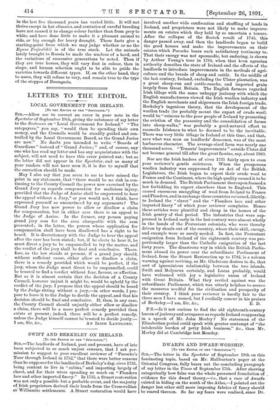SWIFT AND BERKELEY ON IRELAND.
[TO THE EDITOR OF THE " SPECTATOR."] Sin,—The landlords of Ireland, past and present, have of late been subjected to so much unjust censure, that I ask per- mission to suggest to your excellent reviewer of "Pococke's Tour through Ireland in 1752," that there were better reasons than he supposes for the landlords of Berkeley's day, circa 1735, being .content to live in "cabins," and importing largely of claret, and for their wives spending so much on " Flanders lace and other imported finery." In 1735, a Stuart restoration was not only a possible but a probable event, and the majority of Irish proprietors derived their lands from the Cromwellian or Williamite settlements: A Stuart restoration would have involved another wide confiscation and shuffling of lands in Ireland, and proprietors were not likely to make improve- ments on estates which they held by so uncertain a tenure. After the collapse of the Scotch revolt of 1745, this- danger passed away, and then the landlords began to build the good houses and make the improvements on their estates which Pococke bears such satisfactory testimony to.. That their energy was not spasmodic, but enduring, is shown by Arthur Young's tour in 1784, when that keen agrarian authority describes the state of Ireland and the efforts of the to introduce improvebients in the methods of agri- culture and the breeds of sheep and cattle. In the middle of the last century, Ireland, excluding the Ulster plantation, was a great sheep-run and cattle-ranehe, and imported grain largely from Great Britain. The English farmers regarded Irish tillage with the same unhappy jealousy with which the English manufacturers viewed the Irish woollen industry and the English merchants and shipowneis the Irish foreign trade. Berkeley's ingenious theory, that the development of the- woollen trade (he probably meant the export of crude wool) would be "ruinous to the poor people of Ireland by promoting the eviction of the peasantry and the consolidation of farms into sheep-walks," was probably a good-natured effort to• reconcile Irishmen to what he deemed to be the inevitable.. There was very little tillage in Ireland at this time, and that, save what was seen on landlords' demesnes, was of the most barbarous character. The average-sized farm was nearly one thousand acres. " Tenants' improvements " outside Ulster did not become general till after the great famine, say, about 1860.
Nor are the Irish leaders of circa 1735 fairly open to even your reviewer's gentle strictures. When the prosperous• woollen industry was suppressed by an Act of the British . Legislature, the Irish began to export their crude wool to France and the Continent, where its high quality caused it to be much in demand. The British Parliament thereupon framed a. law forbidding its export elsewhere than to England. This caused enormous smuggling of wool from Ireland to France and Flanders, and in exchange these countries returned, illicitly, to Ireland the " claret " and the " Flanders lace and other imported finery" of which your reviewer complains. Hence these articles were plentiful and cheap in the homes of the- Irish gentry of that period. The industries that were sup- pressed in Ireland early in the last century were almost wholly- in the hands of the Protestant colonists, who were thereby- driven by shoals out of the country, where their skill, energy, and example were so sorely needed. In fact, the Protestant emigration from Ireland of the eighteenth century was pro- portionally larger than the Catholic emigration of the last, forty years. The disastrous way in which. the British Parlia- ment abused its power over the subordinate Parliament of Ireland, from the Stuart Restoration up to 1782, is a solemn warning against reviving, as Mr. Gladstone desires to do, that sort of ignominious relationship between the two islands. Swift and Molyneux certainly, and Lucas probably, would have welcomed with joy a legislative union of Ireland with Great Britain. What they reviled against was the subordinate Parliament, which was utterly helpless to secure the measures needful for the civilisation and prosperity of their country. I think your reviewer is hardly fair to the three men I have named, but I cordially concur in his praises
P.S.—Is it not curious to find the old eighteenth-century leaven of jealousy and arrogance as regards Ireland reappearing in a speech of Mr. John Morley P No statesman of the Elizabethan period could speak with greater contempt of "the intolerable burden of petty Irish business," &c., than Mr.. Morley did at Cambridge last Monday.


































 Previous page
Previous page